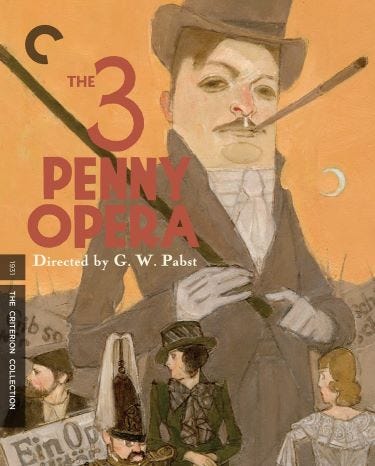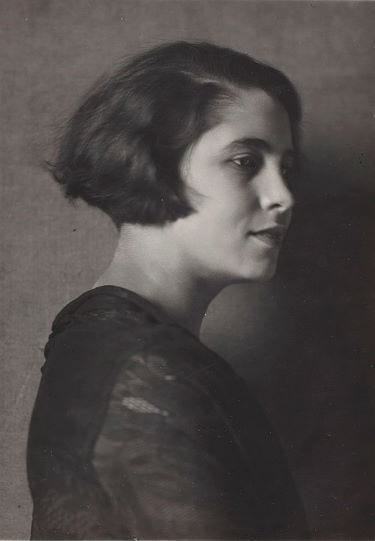
The Threepenny Opera (1931). Grade: B+
I don’t know what, exactly, I expected from this. What I expected was not THIS. I guess I thought I’d be slogging through some ponderous piece of film history as a sort of educational exercise. But there was a lot here that made me laugh, and some moments that gave me shivers. Look out for miss Lotta Lenya!
I’m gonna give you an early song from the movie, and it’s a little “name that tune” test. Go ahead and let it play while you keep reading, you don’t need to read the subtitles to identify the tune. Depending on your age and exposure to older music, of course.
This movie is a filmed version of a HUGELY popular 1928 musical play by Kurt Weill and Bertholt Brecht, one that absolutely swept through Europe like crazy. It’s freely adapted from a 1728 “ballad opera” by English poet/dramatist John Gay, who got the idea from satirist Jonathan Swift. Brecht took the setting and the characters from the Gay version and tweaked the plot a bit, making it a kind of socialist parable about capitalist corruption. Weill provided the music for the 20ish songs, Brecht the lyrics.
Acclaimed German director G.W, Pabst wanted his own twist on the Brecht/Weill version, and Brecht provided a new ending. The studio wanted so many changes, Brecht and Weill both sued, separately; Brecht lost, since he’d already changed the ending so much. Weill won, and some new songs the studio had wanted to add were dropped. (You can read about the production history in Tony Rayns’s Criterion essay.)
Did you identify the song yet? It’s “Mack the Knife.” It was actually added to the play at the last minute; the actor playing Macheath wanted an introduction tune. The version most of us are familiar with was translated by American songwriter Marc Blitzstein in 1954; Louis Armstrong recorded a popular version, and Bobby Darin a later, more popular version. My favorite is probably the Ella Fitzgerald version, because it’s live, she ad-libs some lyrics, and it’s very funny.
(You can turn the clip above off now; it’s the whole movie, cued up to the right start time. Same for another clip later on. There are videos that just have those scenes, separately, but the video quality is awful, and I wouldn’t do that to you.)
The plot: Macheath (sometimes called “Mac” or “Mackie”) more-or-less runs the London underworld, and pays off the cops to let him get away with, on occasion, actual murder. He seduces and quickly marries the young Polly Peachum, to the outrage of her parents; her dad, Mr. Peachum, is in charge of the city’s beggars, who pay him for protection and panhandling rights. Peachum threatens to have the beggars mass-march during the upcoming royal coronation, spoiling the grand event — unless, that is, the police finally nab Macheath and do away with him. Various underlings of Macheath’s criminal organization all play their roles in the story, as do the ladies of Macheath’s brothel.
Right away, the movie’s a stunner; over a black screen, a voice intones, that if all you fine fancy folks in the audience want the poor to be morally upstanding citizens, you better feed ‘em! That if you drive people to desperation, they will do whatever they need to survive. Then we get “Mack the Knife,” as Macheath confdently strolls around, untouchable. Then a beer hall where he conducts his affairs, while conducting an affair; seducing Polly Peachum.
Director G.W. Pabst’s camera is almost constantly moving, in these early parts. (Not so much in the middle sections, alas.) One problem with the introduction of sound was that film cameras were really LOUD, so if you wanted to record audio live on the set, you had to put muffling material around the camera. This made the big cameras even bigger, which meant they were hard to move around. Pabst solves that in the beer hall sequence by having very little synched sound; the place is abuzz with voices and the sounds of glass mugs on tables, but very little in the way of dialogue; it’s all sounds you can mix in later.
Macheath is played by very veteran Austrian actor Rudolf Forster; he’s got swagger to spare. He’s the sort of guy who might use his cane for an elegant twirl, or to whap the heads of annoying children. Polly Peachum is played by Bavarian actor Carola Neher, who’s a little marred by too much makeup and a frilly hairdo; here she is in simpler form:

Wow, Neher was beautiful. And tragically unlucky. Brecht wrote the part for her, but her husband died suddenly right before the premiere. A few years later she’d marry a German Communist, and they’d flee the Nazis to end up in Moscow. Where they were denounced as Trotskyites, her husband was executed, and Neher banished to a prison camp. Where she died of typhus at age 41.
When Macheath and Polly get married, he swears off all other women and all his criminal adventuring. But soon enough, he learns that the cops aren’t gonna stay bought off anymore, so he’ll have to make a run for it — which involves criminal adventuring and taking shelter in the arms of any lady who’ll offer. Polly gets placed in an unusual position with Macheath gone, and this is where Neher really shines; her character gets to start asserting herself instead of being just a love interest.
The various side characters are fairly amusing; critic John Simon said that Valeska Gert (Mrs. Peachum, Polly’s mom), Paul Kemp (a crime underling), and Hermann Thimig (a shotgun-wedding priest) were all noted comic performers of their day. Reinhold Schünzel and Vladimir Sokoloff are even funnier as the crooked police chief and his crooked jailer. Fritz Rasp was kind of a go-to villian in German films for decades; here, as Mr. Peachum, he’s sporting wild facial hair and a goatee that make him look like some crazed 19th-century backwoods preacher. He has a pretty great moment when one of his plans goes utterly wrong.
Your real standouts among the extended cast are Lotta Lenya as a prostitute/cleaning maid and Ernst Busch as the town crier/Greek chorus. Both were veterans of previous Weill/Brecht productions and had been in the stage version of this material; Lenya was married to Weill. Lenya’s character was once in love with Macheath, and shows the underside of all this jolly criminal underworld adventuring; under her public face, she’s trapped in a crappy situation she can’t escape, because she’s too poor to have better options. This song fuggin’ haunted the HELL outta me:
It wasn’t a big part in the stage version, it became much bigger in the film. Nina Simone did a cover version of this song in 1964. That fits.
Some of the period conventions don’t play very wonderfully today. It really always takes me a while to get accustomed to looking through an “iris” (a sort of rounded window of darkness at the corners of the image). I realize this was frequently done in silent films, and something audiences of the period were used to, but I’ve never cared for it. That said, I got resigned to seeing it there. But it took me about half the film to do so.
The climax and finish are outstanding; humor mixed with some very stylish usage of “how many extras and horses can we fit on a sound stage?” Mixed with vicious social satire, too. At one point, a cop and a crook join forces in singing about what good clean fun it was to serve in the British army in India and stamp down those barbaric locals. Don’t think, for a second, that Brecht intends this to be jolly. It’s incredibly bitter. (The lyrics are lifted from Rudyard Kipling, himself a super-promoter of colonialism; Brecht was NOT.) The final shot/singing in the film is absolutely something else.
Brecht was an odd duck; a short documentary on the Criterion disc about the process of turning stage-to-screen described Brecht as a kind of anarchist/Bohemian type. He was hugely influential in the theater world even though, before Threepenny, he’d never had a success. He was a die-hard romantic who constantly cheated on whoever his spouse or partner was at the time; he was a Marxist who hogged the biggest share of the box office he could grab. He inspired film directors like Jean-Luc Godard, his “Alabama Song” (music by Weill) was recorded by the Doors, and “Pirate Jenny” (the song Lenya sings above) was a huge influence on Bob Dylan. Brecht drove Weill (a more conventional sort of fellow) fairly nuts at times, yet it seems to have been a mutually productive professional relationship.
Both men had to flee Germany after the Nazis took power (Brecht for his politics, Weill for being Jewish). Both wound up in America, on opposite coasts. Brecht would leave America after the war ended and the cold war began, as socialists like himself were catching heck in the Red Scare; he ended up back in Berlin, where he started.
G..W. Pabst is not a director I’d ever seen anything by, before; I surely will in the future. He helped popularize silent stars like Louise Brooks and Greta Garbo (and Leni Reifenstahl, who was an actor before she was a groundbreaking director and shameless Nazi propagandist). In photos, he looks like a jovial fellow. When he was in WWI, and captured by the French, he directed French plays in the P.O.W. camp. Most of his famous films came before WWII began, although he’d keep working in film and theater until the 1950s.
There’s also a French version of this movie included with the Criterion discs; it’s not well-loved. And it has a totally different cast. I really adored the German actors who gave us Macheath and Jenny and the town crier here, so I didn’t watch the French one. Simon said “it shows what harm too much Gallic charm and slickness can do.”
I don’t know if, in a few years, I’ll enjoy this as much as I did now; I could also see myself liking it even more. Those two musical numbers (and a few others) are really terrific, the ending's a stunner, and only one song in the film kinda fell flat for me. The movie cut the stage version’s number of songs by more than half, probably for length reasons. I don’t know if that’s a major loss or not, although some devotees of the stage version think it is.
This isn’t for everyone; it’s old and very German. I found it pretty remarkable, though. And if you’ve seen your Bond films, you’ll have seen Lotte Lenya before! She’s the redheaded lesbian baddie in From Russia With Love who kills people with her stabby poison shoe knife. And is very fun to watch in that role, too. She was a famed stage performer and singer for many years; Louis Armstrong, who was a fan, was the first singer to put her name into the lyrics of “Mack the Knife” — now, that line’s canon. Appropriately so.



